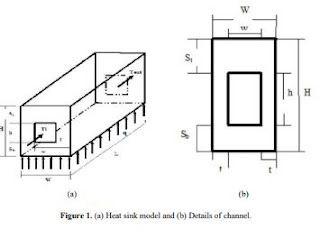Numerical Investigation on Heat Sink Material for Temperature Control of Electronics
Introduction:
The advancement of
technology has led to the development of electronic devices that are becoming
increasingly complex and powerful. However, with this increase in power comes
an increase in heat generation, which can lead to device failure if not managed
properly. This is where heat sink materials come into play. In this blog, we
will discuss the findings of a recent study titled "Numerical
Investigation on Heat Sink Material for Temperature Control of
Electronics" and how it contributes to the field of thermal management.
Background:
The study was conducted
by Shankar Durgam, Bharati Ghodake, and Suhas Mohite from the Department of
Mechanical Engineering at the College of Engineering Pune in India. The researchers
investigated different heat sink materials for their effectiveness in enhancing
heat transfer and cooling electronic devices. The cooling medium used for
analysis was water.
Findings:
The study found that advanced heat sink materials can significantly enhance heat transfer and improve thermal management in electronic devices. The researchers tested various materials such as copper and aluminum and found that aluminum had the highest thermal conductivity among them. This means that it can transfer heat more efficiently than other materials. Simulations were conducted on Ansys, and various experiments were conducted with the materials aluminum and copper to check their conductivities. Pressure and temperature contours were plotted to show effective results.
Pressure and temperature contours of Copper alloy
Pressure and temperature contours of Al6060
Implications:
The findings of this
study have significant implications for the field of thermal management.
Electronic devices are becoming more powerful and compact, which means that
they generate more heat per unit volume than ever before. Therefore, it is
crucial to develop effective cooling solutions to prevent device failure due to
overheating. Advanced heat sink materials such as graphite foam can provide a
breakthrough solution to this problem by enhancing heat transfer efficiency and
improving thermal management. This can lead to the development of more powerful
and efficient electronic devices that can operate at higher temperatures
without the risk of failure.
Conclusion:
In conclusion, the study
"Numerical Investigation on Heat Sink Material for Temperature Control of
Electronics" provides valuable insights into the effectiveness of
different heat sink materials for thermal management. The findings of this
study have significant implications for the development of more powerful and
efficient electronic devices. The material Al6060 is more advantageous with respect to its cost, weight, and machining time compared to other aluminum and copper alloys. Thus, advanced heat sink materials such as Al6060 can provide a breakthrough solution to the problem of overheating in
electronic devices.
References:
https://www.matec-conferences.org/articles/matecconf/pdf/2018/30/matecconf_e3pe2018_02003.pdf
https://en.wikipedia.org/wiki/Heat_sink
https://www.researchgate.net/
https://www.researchgate.net/publication/357648138
Blog Credits:
Bhakti Gujarathi
S.Y. Manufacturing











Comments
Post a Comment